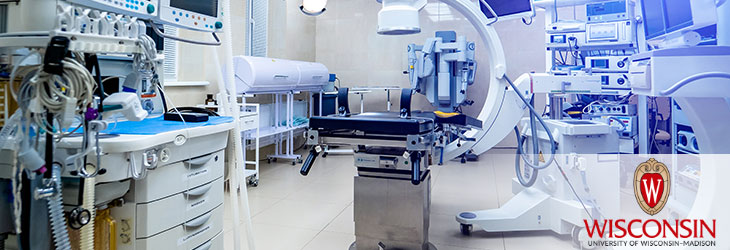Medical Devices

Methods for Detection, Staging and Surveillance of Colorectal Adenomas and Carcinomas
WARF: P160352US02
Inventors: Michael Sussman, Melanie Ivancic, Gregory Kennedy, William Dove, Perry Pickhardt, Mark Reichelderfer
The Wisconsin Alumni Research Foundation (WARF) is seeking commercial partners interested in developing improved diagnostics for the detection of colorectal cancer. UW–Madison researchers have identified a panel of protein biomarkers that can be used to noninvasively “stage” cancer (including lymph node status), identify high-risk pre-cancerous polyps, and monitor polyp presence before and after polypectomy.
Overview
In 2016, approximately 135,000 new cases of colon and rectal cancers will be diagnosed and nearly 50,000 will die from this disease, making it the one of the most common causes of cancer related death in the United States. The majority of colon cancers begin as a benign adenomatous polyp and progress to invasive carcinomas through the sequential accumulation of genetic mutations. Biopsies of polyps identified during colonoscopy are evaluated by pathologists who determine if a polyp is cancerous. Patients diagnosed with non-cancerous polyps are monitored over time.
The ability to accurately predict the lymph node invasion characteristic of stage 3 remains largely unsolved in the field of colon cancer biology. Currently, lymph node invasion can only be detected reliably by surgical resection and pathologic analysis of the lymph nodes. Accordingly, patients must undergo such surgeries to determine whether their lymph nodes are compromised, rather than only when compromised lymph nodes justify the surgery. And unnecessary surgery is undesirable, as up to 35 percent of colorectal surgery patients suffer from post-operative complications. Researchers at UW–Madison believe that the confident prediction of the presence of lymph node metastasis could reduce the need for invasive surgical procedures and reduce post-operative complications.
The ability to accurately predict the lymph node invasion characteristic of stage 3 remains largely unsolved in the field of colon cancer biology. Currently, lymph node invasion can only be detected reliably by surgical resection and pathologic analysis of the lymph nodes. Accordingly, patients must undergo such surgeries to determine whether their lymph nodes are compromised, rather than only when compromised lymph nodes justify the surgery. And unnecessary surgery is undesirable, as up to 35 percent of colorectal surgery patients suffer from post-operative complications. Researchers at UW–Madison believe that the confident prediction of the presence of lymph node metastasis could reduce the need for invasive surgical procedures and reduce post-operative complications.
The Invention
UW–Madison researchers have identified a panel of protein biomarkers that can be used to noninvasively “stage” cancer (including lymph node status), identify high-risk precancerous polyps, and longitudinally monitor polyp presence before and after polypectomy. These protein markers reliably distinguish between stage 1, 2 and 3 cancers, as well as low- and high-risk adenomas. Further, select biomarkers revert toward normal levels with the disappearance of such adenomas, suggesting that these markers can be used to monitor for tumor resurgence and long-term care. Overall, this diagnostic advancement should improve colorectal cancer detection, patient treatment and outcomes while also reducing the associated costs.
Applications
- Noninvasive detection, staging and post-operation surveillance of colorectal cancer
Key Benefits
- Noninvasive colorectal detection method for:
- Determining lymph node status
- Quickly “staging” cancer leading to improved patient care
- Distinguishing between high- and low-risk colorectal cancers
Stage of Development
The enrollment goals (and samples analyzed to date) for this ongoing pilot study include the collection of blood serum from 180 patients undergoing routine screening colonoscopy (37 to date), 60 patients with non-metastatic colorectal cancer (36 to date) and serum from 34 patients with known growing adenomas just before polypectomy and 3-4 weeks post-polypectomy (16 to date), which will help evaluate the potential for use of this screen as a surveillance/recurrence tool.
Additional Information
For More Information About the Inventors
Related Technologies
Publications
Tech Fields
For current licensing status, please contact Jennifer Gottwald at [javascript protected email address] or 608-960-9854